
- Originally Published on March 7, 2024
How to Deal With Social Media Impersonation
Social media impersonation poses a growing concern in an age where one’s online identity and reputation often eclipses their real-life identity in popularity. It represents a serious threat to personal and professional reputations, as imposters misuse your name and likeness to deceive others. It also poses tangible risks to your privacy and security.
Social media impersonation occurs when someone creates a social media account using another person’s name, photos, or personal information without permission. This deceit not only infringes on privacy but can also damage the victim’s personal and professional reputation.
Impersonators can interact with your friends, family, colleagues, fans, or business interests, so it is essential to act swiftly and decisively if you discover an imposter account. Here are some effective steps to deal with social media impersonation:
- Conduct a search to identify all imposter accounts,
- Preserve evidence and document all damages,
- Strengthen your social media security,
- Report imposter accounts to social media platforms,
- Send a DMCA takedown notice,
- Report the impersonation to law enforcement, and
- Work with an experienced content removal attorney.
With a background in internet defamation, content removal, and digital privacy, our firm stands at the forefront of combating social media impersonation. We have extensive experience identifying imposters, addressing impersonation, and removing harmful online content and profiles.
In this article, we explain the intricacies of protecting your online identity from impersonation. We also provide actionable strategies to detect, deter, and deal with impersonators effectively.
What is Social Media Impersonation?
Social media impersonation involves creating fake profiles, pages, or accounts that look strikingly similar to real ones. These false accounts trick people into believing they are interacting with actual individuals or organizations, leading to potential emotional distress, reputational harm, and even financial losses. This issue has become increasingly common, affecting both individuals and businesses alike.
Why Do People Impersonate Others on Social Media?
Perpetrators tend to have several motives for impersonating others on social media:
- Financial Scams: They might deceive users into handing over money or sensitive details by engaging in scams or promoting counterfeit products.
- Undermining the Victim’s Image: By pretending to be an individual or a company, these attackers spread misleading information, damaging the target’s reputation and trustworthiness.
- Stealing Personal Information: The impersonators collect personal or financial data from people who are unaware of the deceit, leading to identity theft and other frauds.
Different Types of Online Impersonation Scenarios We See
At Minc Law, we regularly encounter several key forms of online impersonation, each with unique challenges.
Individual Impersonations
This type of impersonation typically targets people to facilitate scams, unauthorized access, or even activities like blackmail using personal content. Imposters create fake profiles to trick others, potentially leading to financial losses or emotional distress. They might also obtain and misuse private information to pressure victims or increase the threat severity.
Business Impersonations
Businesses, particularly prominent companies, face impersonation risks that extend beyond damaging their reputation. Fake accounts can create significant security risks, misleading customers into interacting with them under the guise of legitimate business engagement.
These interactions could lead to consumers falling prey to deceptive offers or dangerous links, risking their personal information and device security.
TikTok Impersonation
Content creators and influencers, especially on platforms like TikTok, frequently confront impersonation issues. Fake accounts emulate real ones, gaining followers and diverting attention from the true content creators.
These imposters may engage in various schemes, such as requesting money for nonexistent business ventures or promoting dubious products, directly challenging the original creators’ efforts and creativity.
Is It Illegal to Impersonate Someone on Social Media?
Impersonating someone on social media by sharing content under their name can have serious legal consequences, including criminal penalties. The legality varies by jurisdiction, with many laws directed against impersonation if it is maliciously used to harm, defraud, harass, or otherwise negatively impact someone.
Not all forms of impersonation are illegal – parody and satire accounts are generally protected as long as they clearly indicate their comedic nature to avoid misleading the public.
Several states have enacted laws against social media impersonation, with penalties ranging from fines to imprisonment, depending on the severity of the offense and its outcomes. California and Texas are among the states with specific laws against social media impersonation. Both states penalize offenders with fines and possible imprisonment. 1 Trusted Source: Legal Statute CA Penal Code § 528.5 (2022). 2 Trusted Source: Legal Statute TX Penal Code § 33.07. Online Impersonation (2021).
In general, impersonating someone—online or offline—is unlawful and can result in criminal or federal charges if it involves false representation with certain consequences. Individuals may also face civil liability for impersonating someone online.
Can a Person Go to Jail For Impersonating Someone Online?
Yes, a person can face jail time for impersonating someone online. The specific penalties vary depending on the jurisdiction and the details of the offense, but the possibility of jail time highlights the seriousness with which the law treats online impersonation.
Effective Steps to Stop Social Media Impersonation
If you encounter social media impersonation of any type, it is crucial to act quickly. By taking immediate and appropriate action, you can mitigate the potential damage to your reputation or personal and financial information.
Identifying Social Media Impersonation
First, identify all the profiles masquerading as you or your business. You can begin by searching social media platforms for your name, your business’s name, and any variations thereof. Keep an eye out for accounts that have similar usernames, profile photos, and content, noting that impersonators often make minor adjustments to usernames or images to evade detection.
For entities battling impersonation, like businesses or influencers, a digital monitoring service could be beneficial for spotting suspicious accounts. Sometimes, your customers or followers will also help you spot fake accounts if they encounter the imposter on their own.
Use free monitoring tools like Google Alerts to receive notifications about online mentions of your name or other relevant keywords. Social Mention is another useful service that offers real-time tracking and analysis of social media content across different platforms.
Expanding your search to Google Images can also reveal where your photos are being used without consent. Regularly using these tools can help you stay ahead of impersonators at no extra cost.
Preserve Evidence of the Impersonation & Document Damages
After spotting impersonation accounts, the next critical move is to safeguard evidence, crucial for supporting your case, especially if legal action or a law enforcement report is in your plans.
Take screenshots of the account profile, including its URL. Document all posts, comments, or messages sent by or related to the account. Screenshots can prevent evidence destruction if the imposter tries to delete their account, and this evidence is necessary if you seek legal remedies.
Also, save any communications linked to the fake profile, whether they are direct messages, comments, or mentions.
If the impersonation has resulted in financial losses or damaged your reputation, compile evidence of these damages. This could include financial records showing a loss of business or testimonials from individuals who encountered the fake account.
For a more robust preservation strategy, consider using professional tools like VisualPing and Page Vault. These services offer a reliable way to record and safeguard evidence of online impersonation, ensuring the legitimacy of the “chain of custody” for your case. This approach strengthens your position for any legal proceedings and ensures that you have a comprehensive record of the impersonation.
Strengthen Your Social Media Account Security
To safeguard against imposters and scams, it is important to maximize your social media security. Implement two-factor authentication (2FA) to add an extra layer of protection beyond just a password. Regularly update your passwords, using strong and unique combinations that are difficult to guess.
Additionally, fine-tune your privacy settings to control the visibility of your information. Limiting what is publicly accessible makes it harder for impersonators to gather the information needed to convincingly mimic your account.
How to Enable 2FA on Instagram
Enabling two-factor authentication (2FA) on Instagram adds an important security layer to your account. Here is how to activate it:
- Select your profile picture at the bottom right to navigate to your profile.
- Tap the menu icon in the top right corner, then select “Settings and privacy.”
- Choose “Security,” followed by “Two-factor authentication.”
- Tap “Get started” at the bottom to start the setup process.
How to Enable 2FA on Facebook
Activating 2FA on Facebook is a fairly straightforward process:
- Tap the menu icon in the top right corner of Facebook.
- Scroll down and select “Settings & privacy,” then tap on “Settings.”
- Navigate to “Password and security.”
- Scroll to find and tap on “Use two-factor authentication.”
- Select the security method you prefer and follow the prompts to complete the setup.
How to Enable 2FA on Twitter
Here is how to secure your Twitter (X) account with 2FA:
- While logged into your account, go to “Settings and Support,” then select “Settings and Privacy.”
- Select “Security and account access” > “Security” > “Two-factor authentication.”
- Choose the “Authentication app” option, then enter your password when prompted.
- Click the “Get started” button to begin the setup.
Report Impersonation Accounts to Social Media Platforms
Once you document and secure evidence, report the fraudulent account to the relevant social media platforms. This triggers the platform’s review process, which could lead to the removal of the imposter account.
Most platforms, including Facebook, Twitter, and Instagram, offer specific protocols for reporting impersonation. They typically ask for details about the impersonating account, such as its URL and display name, along with any evidence you have compiled demonstrating the impersonation.
Consider enlisting others to report the account as well because multiple reports can prompt quicker action from the platform.
How to Report Instagram Impersonation
Follow these steps to report someone on Instagram:
- Go to the impersonator’s profile by clicking or tapping their username.
- Click the three dots next to their username.
- Tap “Report” and “Report Account.”
- Choose “They’re pretending to be someone else.”
- Specify the type of impersonation from the options provided and follow the instructions on the screen.
How to Report a Twitter Account For Impersonation
Here is a simplified guide for reporting an imposter account on Twitter:
- Go to the impersonating account’s profile.
- Click the three dots (more options) icon.
- Select “Report” from the dropdown menu.
- Select who the report is for (e.g., myself, someone else…)
- Follow the prompts to specify that the account is impersonating you or someone else, providing any additional details as requested.
For further reading, please see our comprehensive guide explaining what to do if you are the target of Twitter impersonation.
How to Report Impersonation on Facebook
To report a Facebook profile or page:
- Navigate to the impersonating profile or page.
- Click on the three dots (…) below the cover photo.
- For a page, select “Find support or report Page.” For a profile, choose “Find support or report profile.”
- Proceed with the on-screen instructions, selecting the impersonation category to complete your report.
Facebook’s system will guide you through the report process, making it easier to address impersonation issues promptly.
Send a DMCA Takedown Notice
Discovering that your images or media are being used to impersonate you can be unsettling.
One response that may be available to combat the issues is a Digital Millennium Copyright Act (DMCA) takedown notice. This legal tool demands the removal of copyrighted materials used unlawfully on social media or other online platforms.
If your photographs or media are involved in impersonation, you might have grounds for a copyright infringement claim.
While you can send a DMCA takedown notice on your own, the process is detailed and prone to errors. It is worth consulting with an attorney experienced in these matters to ensure compliance with legal requirements.
For further reading on navigating the DMCA process, please see our guide, ‘How to Send a DMCA Takedown Notice’.
Report the Impersonation to Law Enforcement
If impersonation escalates to unlawful acts like scams or extortion, involving law enforcement may become necessary. The seriousness and motives behind the impersonation, particularly if it jeopardizes your safety, justify pursuing legal action.
Do not hesitate to report these issues to local authorities, the FBI, or the Federal Trade Commission (FTC). Thorough documentation of the circumstances and repercussions can aid an investigation and potentially bring cases against fraud, scams, and other deceptive business practices. If you are concerned for your personal safety or the impersonation has led to significant harm, law enforcement agencies can provide support and guidance.
Work With an Experienced Content Removal Attorney
When efforts to combat impersonation fall short, seek guidance from a content removal attorney. An attorney with expertise in this area can advise you of your options, including issuing cease and desist letters, DMCA takedown notices, direct contact with social media platforms, and other legal remedies.
A knowledgeable legal team can guide you through the potential civil remedies available in your area, drawing on specific laws that apply to your situation.
Cease and desist letters serve as a formal warning to the impersonator about the legal repercussions of their actions, while DMCA takedown notices alert the hosting platform to copyright infringement, demanding the removal of unauthorized content.
If the impersonation escalates to defamation or other forms of online harassment, having an attorney by your side is invaluable. They can explore all legal avenues available to you, ensuring the protection of your rights and reputation online.
How to Protect Yourself Against Online Impersonation Attacks
Protecting yourself against social media imposters is just as important as knowing how to respond. As they say, prevention is worth a pound of cure.
Get Verified
Verified status is a key defense against social media impersonation. A platform’s badge of authenticity does more than just signify your credibility; it also makes it easier for users to distinguish between your genuine account and imposters.
The criteria for verification vary across different platforms. Some may ask for a confirmed phone number, a significant follower count, or evidence of public recognition. Meanwhile, other platforms might offer verification for a fee.
Some platforms even provide verified accounts with additional perks like prioritized support.
Lock Down All Social Media Accounts
If possible, make your social accounts private. Carefully review and adjust the privacy settings on each platform to control who has access to your posts and personal information. By limiting the visibility of your profile, you reduce the risk of others gathering your personal information, which decreases the likelihood of impersonation.
Be Wary of Phishing Attempts
Phishing scams are a preferred tactic to trick people into divulging sensitive information. Be cautious with any unusual emails, messages, or links that ask for your social media credentials. Always check the authenticity of the sender, scrutinize URLs before engaging with them, and refrain from sharing personal information unless you are certain of the request’s validity.
Adopting strong cybersecurity practices and staying alert are key to safeguarding against phishing schemes and other online risks.
For example, be suspicious of emails or messages that appear to be from social media platforms asking for your login details. Remember, genuine platforms will not request your credentials via email or direct messaging.
If you encounter these demands, confirm the source by directly accessing the platform’s official site or reaching out to their customer support, bypassing the link or contact provided in the suspicious message.
Think Twice About What You Share Online
Be mindful of the personal information you share on social media. Refrain from posting sensitive details such as your home address, phone number, or financial information. Also, use caution when receiving friend requests from users you do not recognize.
The less personal information you make available online, the more challenging it becomes for impersonators to create convincing fake profiles that mimic your identity.
Utilize Digital Risk Protection Services to Monitor the Internet
Digital Risk Protection (DRP) services can provide more comprehensive online security. These services actively scan the internet for mentions of your name or business, including social media platforms, to identify potential threats. By keeping a vigilant eye on the internet, these tools provide an early warning system for any impersonation attempts.
At Minc Law, we provide digital risk protection services for individuals and businesses that want to comprehensively monitor their online reputations and eliminate threats as they appear.
★★★★★
“Attorney Dorrian Horsey at Minc Law represented me in a content removal effort and was successful. She was very open with me about the process, and helped me understand the approach that she took. She was great to work with and very supportive of my effort. Thank you!”Steven S.
August 11, 2023
To put an end to social media impersonation and monitor the internet for subsequent online attacks, reach out for a free case review by calling us at (216) 373-7706 or filling out our online contact form.
Get Your Free Case Review
Fill out the form below, and our team will review your information to discuss the best options for your situation.
This page has been peer-reviewed, fact-checked, and edited by qualified attorneys to ensure substantive accuracy and coverage.




